Progarchives.com has always (since 2002) relied on banners ads to cover web hosting fees and all.
Please consider supporting us by giving monthly PayPal donations and help keep PA fast-loading and ad-free forever.
/PAlogo_v2.gif) |
|
Post Reply 
|
Page 12> |
| Author | ||||
mystic fred 
Special Collaborator 

Honorary Collaborator Joined: March 13 2006 Location: Londinium Status: Offline Points: 4252 |
 Topic: Re-mastered? Topic: Re-mastered?Posted: June 18 2008 at 14:22 |
|||
|
turning the volume up doesn't appear to change the overall sound, Mike.
I have a sort of virtual "spectrometer" ( for use of a better word ) that gives visual readout charts to sound frequencies coming through a given source - will rig this up at the weekend and report back !
Well here are the comparison results visually represented on Cleaning Lab, and fairly clearly they illustrate that vinyl has a higher frequency response than CD (the charts show left and right channels top and bottom).
I used Led Zeppelin 2 again for the tests, one a Quiex vinyl copy and a remastered CD.
the first pictures show the frequency response (regardless of volume as volume does not affect these readings) from the computer (M-Audio Audiophile 2496 soundcard) of the vinyl copy, track 1 "Whole lotta love",
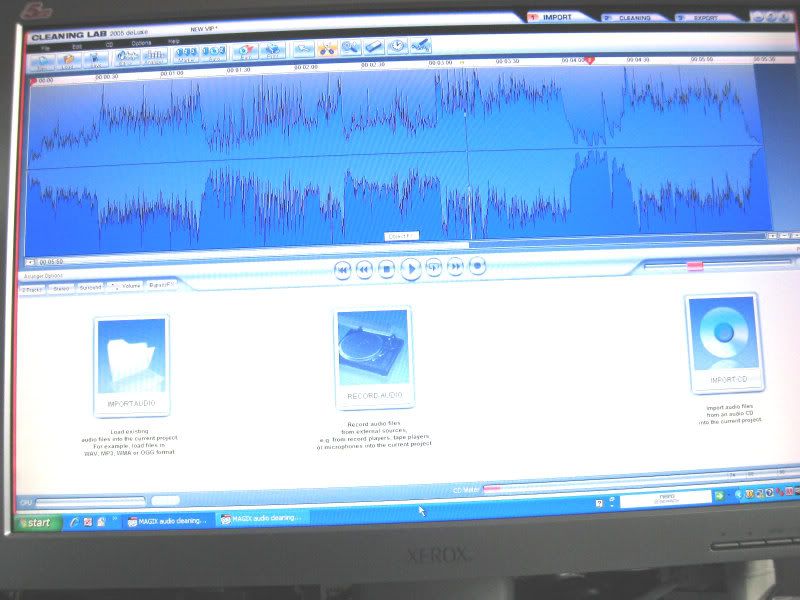 close up -
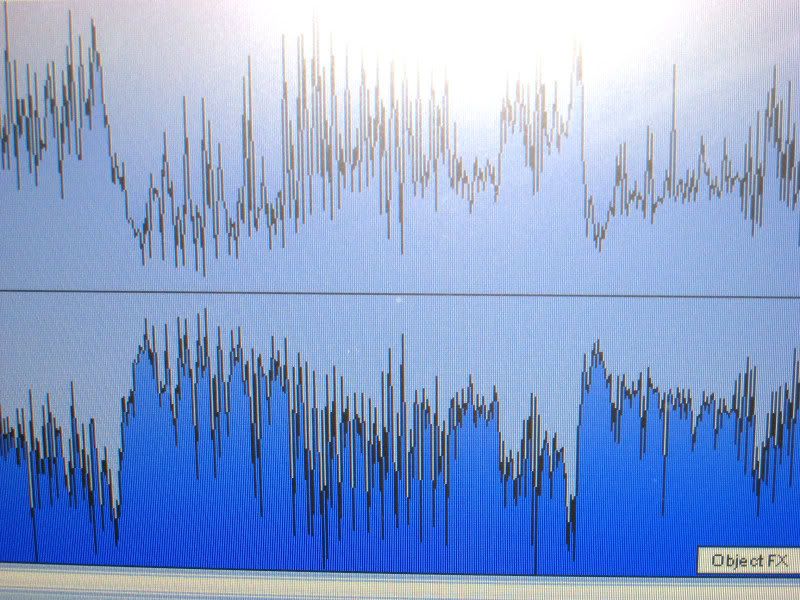 the same track on CD shows a remarkable difference-
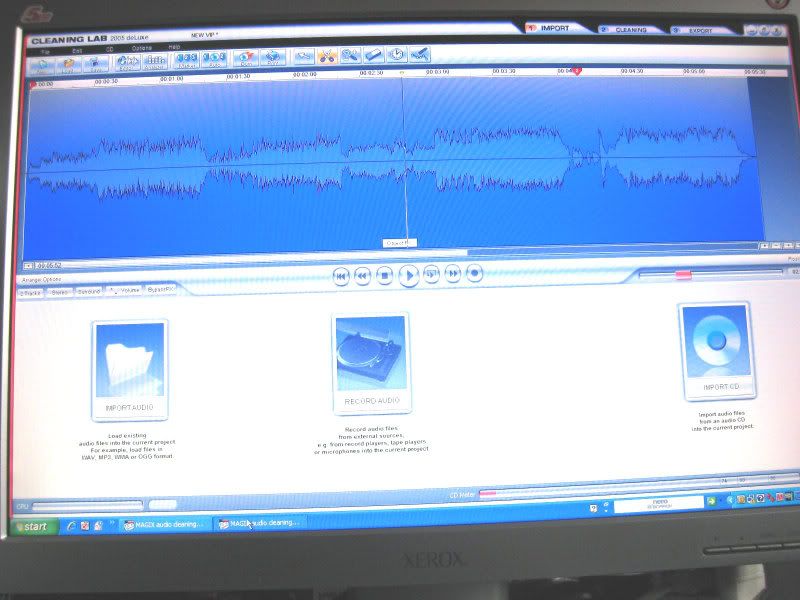 close up -
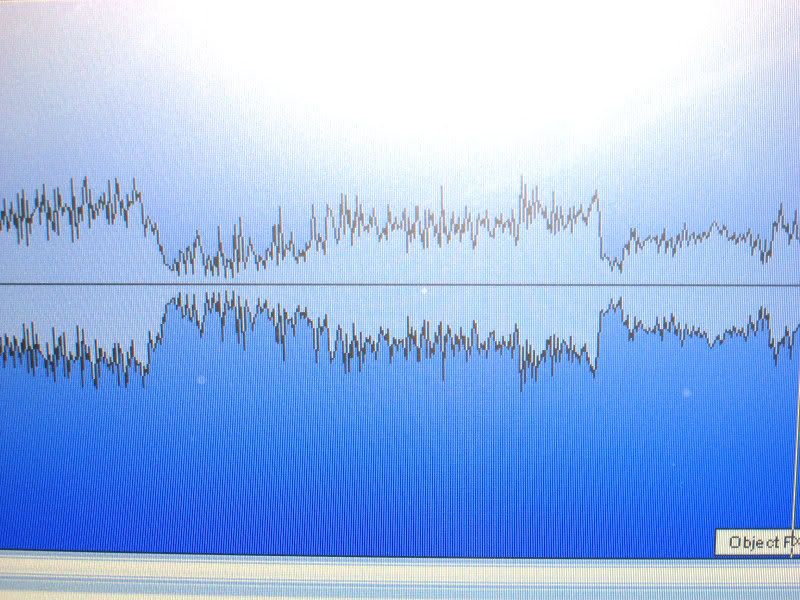 the differences were audibly different, even though as with visual things (our brain automatically "adjusts" differences and anomalies to any given real life sounds or image and balances it, ie colours at time of day; bluey, brown sunlight or UV light, and artificial light; light bulbs give off a yellow light, fluorescent strips are green , we see them as normal but in photography special film or filters are needed to correct these) after time listening to one source sounds normal, but a side by side comparison will reveal differences.
Regarding distortion levels read the article in this month's "Hi Fi World" - "Dirty Digital", in which it states -
"Noel Keywood explains some little known reasons why CD suffers from hard grey sound.....Here are some of the peculiar problems that affect our oldest , original digital technology - compact disc. This isn't a hatchet job of the poor little Frisbee, so much as an illustration of how the notion of it being perfect is fantasy '
vinyl isn't perfect either but is still superior to CD....
" The two parameters most commonly quoted to support a claim for perfection from CD was a distortion level of 0.001 % and a dynamic range of 96 dB. These are very good figures, ones that seduced most people back in the 1980's. If true, CD players like those tested this month (Cambridge Audio, Audiolab, Pioneer and Rotel) would all be perfect and all we ever needed, but the reality is a little more complex. A distortion figure of 0.001% is impressive, and in fact, today's CD players are returning 0.0003% on our test bench. Not bad - and definately better than LP, which manages 0.1% up to 2%. Unfortunately, figures like these are almost meaningless unless considered in more detail, and the 0.001% for CD is particularly selective and misleading...."
"....To make a check on the distortion of a digital system like CD, a signal at -60dB below full level is commonly used. In the early days this gave around 1% distortion, a figure that would have not have sold many players had Phillips ever published it. Bearing in mind that they were not all confident CD would catch on (nor Sony I would imagine) it is hardly surprising they did not use this figure, as it was no better than LP. Twenty five years of progress in digital converter technology has reduced CD distortion at -60dB by five times - from 1% down to 0.2% or so, as produded by our players under test this month"
(listed above).
"Seems quite good, until another little known complexity is taken into account. CD distortion levels are not only level dependent - and measurement is only made nowadays at frequencies where CD gives its best result. That 0.2% result rises to no less than 1.7% I found when making measurement for this article. ..."
" The point is that CD has a complex distortion pattern, one that changes appreciably across the audio band, with levels reaching above Harold Leaks's declared 0.1% level of acceptability made back in 1945.
In its distortion, 16 bit digital is quite unlike analogue - and it's something of a horror story. That CD ever managed to gather a reputation for good sound quality is a surprise, given that it measures so badly. The music business was bitten hard by the inadequacies of poor digital (recorders and players) in the early days and now tries to keep music levels well above the unacceptably high distortion floor of CD ....nowadays 24bit recorders are commonly used as they give a smoother sound, even when transferred to 16bit medium. As if high distortion levels weren't bad enough, perhaps worse is that digital distortion on CD has a particular nasty sound that the ear can detect readily....It so happens that CD behaves like this, low sounds producing harmonic distortion well up the frequency band, so far separated
in frequency that the ear clearly detects it (LP doesn't do this). ....CD does everything wrong, so it is surprising that we can listen to it at all....."
"Digital distortion has a largely uncorrelated twittering pattern that the ear detects readily and finds discordant and irritating. Again, LP does the oppposite, being relatively benign in psycho-acoustic terms. It is because LP is benign and also produces ten times less distortion than CD at low levels (0.1% to 1%) that we find it aurally acceptable. It's really no mystery. Any mystery about why LP sounds good and CD dodgy is attributable to our misconceptions about the real behaviour of CD's digital code.."
finally....
"CD digital code emanates from the 1970s and has some gruesome limitations. They are lessened considerably by the use of higher sampling rates and bit depths, something we will hopefully enjoy soon when 24bit / 96Hz digital becomes more common."
CD was introduced as a convenient form of carrying music, but the pretentions outweigh the facts! As has been said before a true audiophile wouldn't be seen dead with a CD player, but for me is better than a cassette player which i replaced in the car, and some albums unavailable on vinyl. Many albums are being published in vinyl these days, but without those extra tracks on...
In the future aforesaid higher sampling rates and bit depths or even some new form of music medium will come along, but as my vinyl albums will last 500 years they'll do till then....
Edited by mystic fred - June 22 2008 at 10:12 |
||||
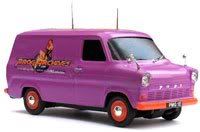 Prog Archives Tour Van Prog Archives Tour Van 
|
||||
 |
||||
MikeEnRegalia 
Special Collaborator 

Honorary Collaborator Joined: April 22 2005 Location: Sweden Status: Offline Points: 21206 |
 Posted: June 18 2008 at 03:05 Posted: June 18 2008 at 03:05 |
|||
|
"jitter and sampling problems" have been eliminated in newer CD players ... the hardware needed for that is much, much cheaper than it was back then.
You said that the CD wasn't as loud as the vinyl ... if anything, that suggests that the CD was mastered with increased dynamic range, and you should simply turn the volume up. |
||||
 |
||||
mystic fred 
Special Collaborator 

Honorary Collaborator Joined: March 13 2006 Location: Londinium Status: Offline Points: 4252 |
 Posted: June 17 2008 at 15:27 Posted: June 17 2008 at 15:27 |
|||
I was very surprised to read this, last year i bought one of the Quiex Zeppelin albums to try and was very impressed at the sound quality, even against the original pressings. I subsequently bought all the other Zeppelin recordings among others. The worst quality vinyl "audiophiles" would be "Simply Vinyl" and much maligned "Arkarma" records made in Italy, though i have some very decent Arkama records.
Anyway to prove or disprove the above claims highlighted in red i decided to do a listening / timing test of my own on my Roksan Xerxes turntable with Rega arm between -
1. 1969 1st pressing plum/red near mint vinyl Atlantic copy of "Led Zeppelin 2" , (side 1)
2. mint copy of Quiex vinyl Led Zeppelin 2. ( side 1)
3. "remastered" CD copy of Led Zeppelin 2 (first 4 tracks)
On listening to the original pressing (1) , despite very slight surface noise and a little grain in the highs (these pressings were designed to play on 1969 equipment so are a little sharp) overall sound was rich, loads of bass, space and very involving. music time start to finish for side 1 clocked in at 21 minutes and 28 seconds.
Compared to the original the Quiex (2) was, as expected, quieter in the surface noise department but had lost none of the original music's excitement and involvement - the searing highs, metallic tings of Bonzo's cymbals and deep bass were all there, and the sound level was identical. Many claim these recordings have better detail than the original but i will be conservative and say it's exactly the same, though i was sure i caught a few extra details i hadn't noticed before in the mix. clocking in at 22 minutes and 5 seconds, this was 37 seconds longer than the original, so the "faster speeding up mickey mouse/donald duck" theory is - well, "mickey mouse" !!
Listening to the JP remastered CD (3) directly after the vinyl seemed slightly disappointing - i used my best CD player, a supposedly lively and analogue-sounding Rega Apollo, but it was as if a thin veil had been placed over the music, with the same volume setting the music sounded quieter, though slightly tidier the result was less exciting and less involving, in a word - "dry". I suppose a twiddle with the tone and volume controls could have livened it up but to keep the test fair and honest left them alone. time between tracks 1 and the end of track 4 "Thankyou" clocked in at 21 minutes and 17 seconds, a nano-tad faster than the original vinyl pressing!
so marks out of ten i would give the Quiex 9, the original Atlantic copy 8 (though not bad for 39 years old and many plays) , and the CD a slightly disappointing 6.
The Quiex recordings of Led Zeppelin are now deleted and as a result are fetching around 70 to 100 pounds each to buy, EX or NM copies of the original can be bought slightly cheaper, and the CD for a couple of pounds.
As for "remastering" i would add this - back in 1983 CD's were a sonic disaster, as they were direct transfers from analogue tapes, and most people were playing their vinyl on crappy music centres so the brand new CD system sounded "better". They, the manufacturers, found the original masters had to be re-eq'd, compressed and digitised for successful transfer to the digital 16 bit CD medium for best results, and so today's recordings are much much better, especially the 24 bit recordings, but still not as involving as vinyl in my opinion, many CD players still suffer from jitter and sampling problems .
do the ruddy test yourself if you don't believe me - don't listen to gossip!
Edited by mystic fred - June 18 2008 at 02:13 |
||||
 Prog Archives Tour Van Prog Archives Tour Van 
|
||||
 |
||||
Sacred 22 
Forum Senior Member 

Joined: March 24 2006 Status: Offline Points: 1509 |
 Posted: June 01 2008 at 00:26 Posted: June 01 2008 at 00:26 |
|||
|
||||
 |
||||
Dean 
Special Collaborator 

Retired Admin and Amateur Layabout Joined: May 13 2007 Location: Europe Status: Offline Points: 37575 |
 Posted: May 31 2008 at 20:25 Posted: May 31 2008 at 20:25 |
|||
Intermodulation Distortion, being non-harmonic, is reflected in the SNR figures and the effect of clock jitter on SNR is well documented (aka aperture error). The effects of jitter on a 16-bit coder are negligible compared to the quantisation error, so regardless of the number of bits in the source (24-bits digital or infinite-bits analogue) the 96dB absolute minimum noise-floor of a 16-bit digital signal is still the defining factor. Improvements in clock stability techniques have not improved the characteristics of 16-bit converters - what it has led to is the ability to make viable 24-bit converters.
The major filter (if not the only filter) in an ADC is the anti-aliasing filter which prevents spurious signals greater than 22.05kHz being aliased into the audio band - if the source is taken from master tape then there will be none of those frequencies present in the original recording anyway, all the anti-aliasing filters do is prevent any external signals from affecting the recording. Raising the sampling frequency to 192kHz has meant that making anti-aliasing filters has become easier since lower order (hence cheaper) filters can be used.
|
||||
|
What?
|
||||
 |
||||
Certif1ed 
Special Collaborator 

Honorary Collaborator Joined: April 08 2004 Location: England Status: Offline Points: 7559 |
 Posted: May 29 2008 at 02:46 Posted: May 29 2008 at 02:46 |
|||
If you don't want to discuss the topic or contribute to the thread, then feel free to not post. Edited by Certif1ed - May 29 2008 at 02:47 |
||||
|
The important thing is not to stop questioning.
|
||||
 |
||||
Sacred 22 
Forum Senior Member 

Joined: March 24 2006 Status: Offline Points: 1509 |
 Posted: May 29 2008 at 02:46 Posted: May 29 2008 at 02:46 |
|||
Intermodulation distortion is the one we have to worry about the most. This kind of distortion produces audio frequencies that are not related to the original music tones and most of this is a result of poor filtering and high jitter levels. We are still left with the original 44.1 KHz sample rate and 16 bit depth but the newer digital gear deals with the problem of jitter and filtering to a far better degree and as a result the sound is cleaner. Unother words we are left with less of those unwanted intermodulation distortion artifacts.
|
||||
 |
||||
Slartibartfast 
Collaborator 

Honorary Collaborator / In Memoriam Joined: April 29 2006 Location: Atlantais Status: Offline Points: 29630 |
 Posted: May 28 2008 at 18:45 Posted: May 28 2008 at 18:45 |
|||
|
Oh, to heck with it all, let's just stick to live music, like the good old days before any recording methods were invented.

|
||||
|
Released date are often when it it impacted you but recorded dates are when it really happened...

|
||||
 |
||||
Certif1ed 
Special Collaborator 

Honorary Collaborator Joined: April 08 2004 Location: England Status: Offline Points: 7559 |
 Posted: May 28 2008 at 08:28 Posted: May 28 2008 at 08:28 |
|||
That'd be interesting - the (1st press) vinyl absolutely ROCKS - not nearly as much as Led Zep II, but it's still a building-shaker on the right system.
(Note the lack of EMI logo - the subsequent EMI pressings weren't nearly as good)
 |
||||
|
The important thing is not to stop questioning.
|
||||
 |
||||
TGM: Orb 
Prog Reviewer 

Joined: October 21 2007 Location: n/a Status: Offline Points: 8052 |
 Posted: May 28 2008 at 07:53 Posted: May 28 2008 at 07:53 |
|||
|
Interesting thread
 |
||||
 |
||||
Dick Heath 
Special Collaborator 
Jazz-Rock Specialist Joined: April 19 2004 Location: England Status: Offline Points: 12813 |
 Posted: May 28 2008 at 07:24 Posted: May 28 2008 at 07:24 |
|||
|
If you want a reference point to what remastering can do, compare Deep Purple's In Rock on vinyl released in the early 70's against the remaster CD.
|
||||
|
The best eclectic music on the Web,8-11pm BST/GMT THURS.
CLICK ON: http://www.lborosu.org.uk/media/lcr/live.php Host by PA's Dick Heath. |
||||
 |
||||
Dean 
Special Collaborator 

Retired Admin and Amateur Layabout Joined: May 13 2007 Location: Europe Status: Offline Points: 37575 |
 Posted: May 28 2008 at 04:38 Posted: May 28 2008 at 04:38 |
|||
Eventhough the ADC's used in the 80s were 'inferior' to those used today, the bottom line is the data encoded on a CD is still 16-bits sampled at 44.1KHz regardless of the sampling frequency and the number of bits on the digital master. All you can compare between the ADCs of then and now is the Signal-to-Noise ratio and the Total Harmonic Distortion - these improvements are practically lost when the data is re-sampled to 16-bits @ 44.1KHz. Re-mastered CDs are effectively a downgrade of the digital master. You cannot even guage the 'improvements' of higher bit-rate 24-bit encoding of downloads when the original source material was lifted from the CD since any over-sampling and interpolation is an artifical recreation.
|
||||
|
What?
|
||||
 |
||||
Certif1ed 
Special Collaborator 

Honorary Collaborator Joined: April 08 2004 Location: England Status: Offline Points: 7559 |
 Posted: May 28 2008 at 04:31 Posted: May 28 2008 at 04:31 |
|||
Yup - good point.
Equalisation is changing the frequency envelope of a sound. ALL effects do that, including compression. I simply wasn't making the distinction... just using EQ as shorthand
Don't get me started on digital compression... Edited by Certif1ed - May 28 2008 at 04:32 |
||||
|
The important thing is not to stop questioning.
|
||||
 |
||||
Sacred 22 
Forum Senior Member 

Joined: March 24 2006 Status: Offline Points: 1509 |
 Posted: May 27 2008 at 21:14 Posted: May 27 2008 at 21:14 |
|||
|
||||
 |
||||
Drew 
Forum Senior Member 

Joined: June 20 2005 Location: California Status: Offline Points: 12600 |
 Posted: May 27 2008 at 19:51 Posted: May 27 2008 at 19:51 |
|||
|
AWESOME guys- Thanks so much

|
||||
|
|
||||
 |
||||
Dean 
Special Collaborator 

Retired Admin and Amateur Layabout Joined: May 13 2007 Location: Europe Status: Offline Points: 37575 |
 Posted: May 27 2008 at 17:41 Posted: May 27 2008 at 17:41 |
|||
|
It's not entirely down to the EQ'ing - though that is largely a matter of taste and preference rather than restricted by the recording medium, the major part of re-mastering is in the compression of the music after Equalisation has been applied. To my ears this is the most noticeable affect of re-mastering. In the past compression was used to limit the 'width' of the groove on the vinyl so more music could be recorded on a single side of the 12" disc(consider the visible groove difference between a 12" single and a 12" LP), in the digital realm you do not have this limitation, so can afford a wider dynamic range (the difference between quiet passages and loud).
In theory digital music should have wider dynamic range than vinyl, in reality it does not.
Unfortunately a wide dynamic range does not suit modern listening (small speakers, cheap headphones, pc-speakers etc.), so modern music is heavily compressed to make it all sound louder overall in what has been called "The Loudness War" [http://en.wikipedia.org/wiki/Loudness_war]
|
||||
|
What?
|
||||
 |
||||
MikeEnRegalia 
Special Collaborator 

Honorary Collaborator Joined: April 22 2005 Location: Sweden Status: Offline Points: 21206 |
 Posted: May 27 2008 at 05:20 Posted: May 27 2008 at 05:20 |
|||
Of course that's a definitive advantage of a digital recording process ... no tapes need to be stored, and digital backups can be made of the original recordings. |
||||
 |
||||
stonebeard 
Forum Senior Member 

Joined: May 27 2005 Location: NE Indiana Status: Offline Points: 28057 |
 Posted: May 27 2008 at 04:48 Posted: May 27 2008 at 04:48 |
|||
|
An animal sacrifice is sometimes involved.
When one fails to appease the Master Tape god, bad things happen (re: Vapor Trails) |
||||
 |
||||
Certif1ed 
Special Collaborator 

Honorary Collaborator Joined: April 08 2004 Location: England Status: Offline Points: 7559 |
 Posted: May 27 2008 at 04:45 Posted: May 27 2008 at 04:45 |
|||
|
^I maintain it depends - just because you have a way of re-EQ'ing (which is all it boils down to) it doesn't necessarily mean you're going to make it sound better. And most (if not all) noise removal tools also remove "desirable" noise which is part and parcel of the original sound. It is entirely debatable (and there is no satisfactory technical answer) that any remaster is "as good as the original".
Also, not all tapes are kept in good order - and every time they're exposed to the elements, they degrade. Some of the stories I've heard from engineers about some masters would make you weep - one particular story I heard involved the master tape of "DSoTM"...
Listen to an original vinyl press of the album (1st press, naturally!), then listen to any subsequent release.
I defy anyone to actually prefer a later pressing.
|
||||
|
The important thing is not to stop questioning.
|
||||
 |
||||
Sacred 22 
Forum Senior Member 

Joined: March 24 2006 Status: Offline Points: 1509 |
 Posted: May 27 2008 at 03:51 Posted: May 27 2008 at 03:51 |
|||
|
The original analog tapes are stored away in vaults and kept in pretty good order. As time goes by technology improves. When CD was first introdced the analog to digital equipment of the day was not to the same standard as it is now. As a result, many of the early CD's produced sounded harsh and overly bright and this was primarily due to jitter which is a form of digital distortion and poor filtering. Take those same analog tapes and use the equipment that is available today what with higher sampling rates, and bit depth not to mention much lower jitter than ever before and presto, you have a remastered digital copy of the original analog tapes. With DSP (digital signal processing) you can remove all the unwanted artifacts such as noise etc etc and now you have a CD remaster that sounds as good as the original analog tape.
|
||||
 |
||||
Post Reply 
|
Page 12> |
| Forum Jump | Forum Permissions  You cannot post new topics in this forum You cannot reply to topics in this forum You cannot delete your posts in this forum You cannot edit your posts in this forum You cannot create polls in this forum You cannot vote in polls in this forum |